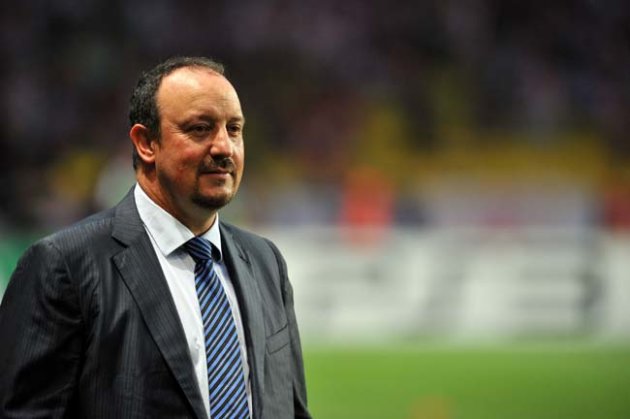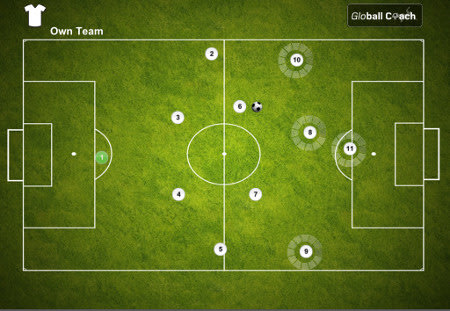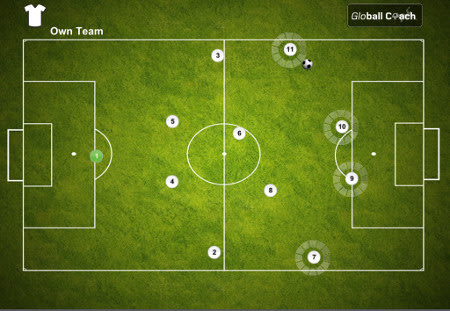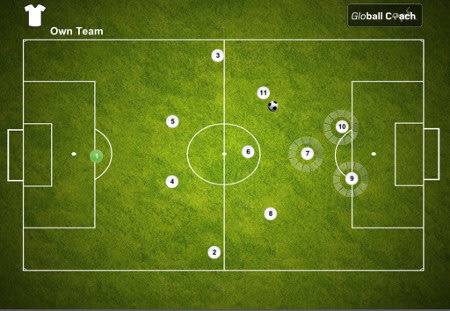Balancing past, present and future

 By Rafael Benitez
By Rafael Benitez
By Rafael Benitez | Rafael Benitez – Tue, Jan 24, 2012 13:16 GMT
[FONT=Georgia, Times, 'Times New Roman', serif] PA-9386987Just a couple of hours before writing this I finished a talk, a discussion, in front of a mixture of candidates for the UEFA Pro Licence and a refresher course for the same licence organised by the FA. I would like to take the opportunity to share with you here some of the ideas discussed.
PA-9386987Just a couple of hours before writing this I finished a talk, a discussion, in front of a mixture of candidates for the UEFA Pro Licence and a refresher course for the same licence organised by the FA. I would like to take the opportunity to share with you here some of the ideas discussed.
In any new working environment you always have to consider the past, which is obviously important, but you cannot dwell on it and still hope to evolve. In my opinion, I will say again that balance between the two is the key and that is what I tried to explain in the talk with the coaches.
Let's talk about structures, systems and chances of success. Drawing on the experience I had in three leagues where myself and my team were lucky enough to work, I talked first about the structure and organisation of most of the clubs in each of these leagues to see if one can be more successful than the others. At the same time, I discussed the most common systems used in each of them.
I have covered that subject on these pages in a previous blog.
In Spain, with the Sporting Director role and/or the Technical Director role being responsible for the football section and working closely with my technical staff we won two league titles and a UEFA Cup, as well as a couple of promotions with Extremadura and Tenerife, which clearly shows that this structure does not in itself cause a problem. The common playing system in the Spanish League at that time used to be 4-2-3-1 with its variants. And we used to use it with reasonable success.
 4-2-3-1
4-2-3-1
In England, with 4-4-2 as the common system for most teams at the time and a structure where the Manager is the most important person on the playing side of things, we managed to win domestic cups, like the FA Cup and the Community Shield, and in Europe with the Champions League and European Super Cup. Amongst others we reached three finals in the Carling Cup, Champions League and Club World Cup. Neither the structure of the club nor the system or style of play (we mainly used 4-2-3-1 again) were an obstacle to winning trophies despite a change of footballing scene (England from Spain).
 4-4-2
4-4-2
Lastly, in Italy, with a structure and organisation similar to Spain, with the role of Sporting Director or Technical Director in theory making the football decisions, we managed to win an Italian Super Cup, Club World Cup and qualification for the knock-out phase of the Champions League with a match to spare. Having looked at and analysed the working conditions, these weren't exactly poor results in the big picture. But because we were there only five months, we will never know what would have happened with the resources for which we asked and were agreed. Here the most common system was 4-3-1-2 by most clubs we faced.
 4-3-1-2
4-3-1-2
It's obvious, and there's no denying it, that the main organisational difference we find when comparing England with Italy and Spain, is the role of Manager compared to the roles of Sporting Director and/or Technical Directors. On the pitch, Italian football is much slower and more tactical, while in Spain and England they play a much quicker and more technical game and certainly in England it is more physical.
The aim at the outset was to consider whether one structure, system or style was more successful than another. But Liverpool, as well as United, AC Milan, Inter or Barcelona have all been Champions of Europe in the last few years representing the football and idiosyncrasies of their respective home country. So we can conclude that it depends more on the team and their capabilities rather than the structure, culture and philosophies in each country or the systems used in each one. So that is some sort of conclusion.
The Future
On arriving at a new club, with a new structure, you have to consider the club culture, the city, the feelings of the fans, assess the technical staff and other employees who can influence things and whose experience you can use. And at the same time, respect the traditions, the guidelines, everything that will not harm performance but can serve as a true club identity.
We talked about the Financial Fair Play and the importance of youth football in dealing with the future economic climate.
Regarding the decisions you have to take on arrival, it is essential to analyse the squad you have by position, age, contract length, attitude and commitment, potential and nationality to conform to the rules.
This last aspect is tremendously important and many 'experienced commentators' don't realise that you cannot judge a foreign player arriving in a new league with a player who knows it well. In my talk with the coaches, I gave a simple example, the exchange rate.
At first it looks like something unimportant but when you have to convince players and negotiate with their agents, it is absolutely essential to know the value of the money to be more persuasive.
You have to realise that the pound was stronger compared to the Euro when we arrived in England but our ultimate reference point was still pesetas, the old Spanish currency.
We also tried to change the day-to-day operating of the club to our own personal and professional way of working. We immediately analysed the past medical and physical tests of the players and the results, the history of injuries for each player, watched all the past games we could to get an idea of each player, the style of play, considered the competitions we were in and canvassed the technical staff to get their opinions. We got to know everything there was to know about the club, the staff and the club in general.
With all this information we compiled an annual work plan which in turn was divided up monthly, weekly and daily. And with specific goals for each period.
Each day prior to training, there is a meeting with the medical staff and physios to discuss the physical condition of each player, and with the information we could finish off the prepared session of the day. After the session we had another meeting to assess what actually happened, because you can't always achieve what you wanted, and prepare the next session.
At the talk, we showed clips of positive and negative issues in different cases, such as squad rotation and marking at corners for example. For this we used the Amisco program, data published by Opta and also data from our own programs. We never forget that the key to the truth is in knowing how to interpret and manage the data.
The Training Session
After the regular meeting with the medical staff to establish how the players are, there is a meeting with the technical staff to finalise the session.
Our sessions normally last between 60 and 75 minutes. During that time we always require intensity and a good atmosphere where the players apply themselves and want to improve. Around 80% of our work across a season is with the ball, with common objectives and a variety of exercises.
 Training
Training
Lastly, and as an added extra, we have specific work for some players, in groups or as individuals. This is especially important for the younger players to improve specific aspects of their game.
At the end of the daily work, as I said before, we spend time recording information and analysing it to adjust our work for the coming days.
Competition
Finally, at the talk with the FA coaches, I addressed the subject of competition.
We prepare the game plan which we have been working on during the week, what we want our team to do. We prepare the team talk using the tactics board and video to analyse the opposition and animations which we create in one of our own programs. We want to get the message clearly across so there are no doubts. That is the aim.
We insist on motivation, concentration and we try to ensure the players cope with the pressure and we look to play the match with a high level of performance. If a player knows what to do and how to do it, they will have a bigger chance of success.
During the game, at half- time and after the final whistle, we record the player data from the different technical staff and we begin the cycle again. Sometimes this is done with more or less satisfaction, depending on the result and how it was achieved but always with the same dedication and passion of the previous day.
We try to always remember what was done to make the club and the team stronger, but also that times change and new trends appear quickly. You always have to recognise the past without losing sight of the future.
Article taken from www.rafabenitez.com
[/FONT]

 By Rafael Benitez
By Rafael BenitezBy Rafael Benitez | Rafael Benitez – Tue, Jan 24, 2012 13:16 GMT
[FONT=Georgia, Times, 'Times New Roman', serif]
 PA-9386987Just a couple of hours before writing this I finished a talk, a discussion, in front of a mixture of candidates for the UEFA Pro Licence and a refresher course for the same licence organised by the FA. I would like to take the opportunity to share with you here some of the ideas discussed.
PA-9386987Just a couple of hours before writing this I finished a talk, a discussion, in front of a mixture of candidates for the UEFA Pro Licence and a refresher course for the same licence organised by the FA. I would like to take the opportunity to share with you here some of the ideas discussed.In any new working environment you always have to consider the past, which is obviously important, but you cannot dwell on it and still hope to evolve. In my opinion, I will say again that balance between the two is the key and that is what I tried to explain in the talk with the coaches.
Let's talk about structures, systems and chances of success. Drawing on the experience I had in three leagues where myself and my team were lucky enough to work, I talked first about the structure and organisation of most of the clubs in each of these leagues to see if one can be more successful than the others. At the same time, I discussed the most common systems used in each of them.
I have covered that subject on these pages in a previous blog.
In Spain, with the Sporting Director role and/or the Technical Director role being responsible for the football section and working closely with my technical staff we won two league titles and a UEFA Cup, as well as a couple of promotions with Extremadura and Tenerife, which clearly shows that this structure does not in itself cause a problem. The common playing system in the Spanish League at that time used to be 4-2-3-1 with its variants. And we used to use it with reasonable success.
 4-2-3-1
4-2-3-1In England, with 4-4-2 as the common system for most teams at the time and a structure where the Manager is the most important person on the playing side of things, we managed to win domestic cups, like the FA Cup and the Community Shield, and in Europe with the Champions League and European Super Cup. Amongst others we reached three finals in the Carling Cup, Champions League and Club World Cup. Neither the structure of the club nor the system or style of play (we mainly used 4-2-3-1 again) were an obstacle to winning trophies despite a change of footballing scene (England from Spain).
 4-4-2
4-4-2Lastly, in Italy, with a structure and organisation similar to Spain, with the role of Sporting Director or Technical Director in theory making the football decisions, we managed to win an Italian Super Cup, Club World Cup and qualification for the knock-out phase of the Champions League with a match to spare. Having looked at and analysed the working conditions, these weren't exactly poor results in the big picture. But because we were there only five months, we will never know what would have happened with the resources for which we asked and were agreed. Here the most common system was 4-3-1-2 by most clubs we faced.
 4-3-1-2
4-3-1-2It's obvious, and there's no denying it, that the main organisational difference we find when comparing England with Italy and Spain, is the role of Manager compared to the roles of Sporting Director and/or Technical Directors. On the pitch, Italian football is much slower and more tactical, while in Spain and England they play a much quicker and more technical game and certainly in England it is more physical.
The aim at the outset was to consider whether one structure, system or style was more successful than another. But Liverpool, as well as United, AC Milan, Inter or Barcelona have all been Champions of Europe in the last few years representing the football and idiosyncrasies of their respective home country. So we can conclude that it depends more on the team and their capabilities rather than the structure, culture and philosophies in each country or the systems used in each one. So that is some sort of conclusion.
The Future
On arriving at a new club, with a new structure, you have to consider the club culture, the city, the feelings of the fans, assess the technical staff and other employees who can influence things and whose experience you can use. And at the same time, respect the traditions, the guidelines, everything that will not harm performance but can serve as a true club identity.
We talked about the Financial Fair Play and the importance of youth football in dealing with the future economic climate.
Regarding the decisions you have to take on arrival, it is essential to analyse the squad you have by position, age, contract length, attitude and commitment, potential and nationality to conform to the rules.
This last aspect is tremendously important and many 'experienced commentators' don't realise that you cannot judge a foreign player arriving in a new league with a player who knows it well. In my talk with the coaches, I gave a simple example, the exchange rate.
At first it looks like something unimportant but when you have to convince players and negotiate with their agents, it is absolutely essential to know the value of the money to be more persuasive.
You have to realise that the pound was stronger compared to the Euro when we arrived in England but our ultimate reference point was still pesetas, the old Spanish currency.
We also tried to change the day-to-day operating of the club to our own personal and professional way of working. We immediately analysed the past medical and physical tests of the players and the results, the history of injuries for each player, watched all the past games we could to get an idea of each player, the style of play, considered the competitions we were in and canvassed the technical staff to get their opinions. We got to know everything there was to know about the club, the staff and the club in general.
With all this information we compiled an annual work plan which in turn was divided up monthly, weekly and daily. And with specific goals for each period.
Each day prior to training, there is a meeting with the medical staff and physios to discuss the physical condition of each player, and with the information we could finish off the prepared session of the day. After the session we had another meeting to assess what actually happened, because you can't always achieve what you wanted, and prepare the next session.
At the talk, we showed clips of positive and negative issues in different cases, such as squad rotation and marking at corners for example. For this we used the Amisco program, data published by Opta and also data from our own programs. We never forget that the key to the truth is in knowing how to interpret and manage the data.
The Training Session
After the regular meeting with the medical staff to establish how the players are, there is a meeting with the technical staff to finalise the session.
Our sessions normally last between 60 and 75 minutes. During that time we always require intensity and a good atmosphere where the players apply themselves and want to improve. Around 80% of our work across a season is with the ball, with common objectives and a variety of exercises.
 Training
TrainingLastly, and as an added extra, we have specific work for some players, in groups or as individuals. This is especially important for the younger players to improve specific aspects of their game.
At the end of the daily work, as I said before, we spend time recording information and analysing it to adjust our work for the coming days.
Competition
Finally, at the talk with the FA coaches, I addressed the subject of competition.
We prepare the game plan which we have been working on during the week, what we want our team to do. We prepare the team talk using the tactics board and video to analyse the opposition and animations which we create in one of our own programs. We want to get the message clearly across so there are no doubts. That is the aim.
We insist on motivation, concentration and we try to ensure the players cope with the pressure and we look to play the match with a high level of performance. If a player knows what to do and how to do it, they will have a bigger chance of success.
During the game, at half- time and after the final whistle, we record the player data from the different technical staff and we begin the cycle again. Sometimes this is done with more or less satisfaction, depending on the result and how it was achieved but always with the same dedication and passion of the previous day.
We try to always remember what was done to make the club and the team stronger, but also that times change and new trends appear quickly. You always have to recognise the past without losing sight of the future.
Article taken from www.rafabenitez.com
[/FONT]
 Paul Marin -19 is one thing, 20 is a whole other matter. It gets even worse if they win the UCL. *groan*.
Paul Marin -19 is one thing, 20 is a whole other matter. It gets even worse if they win the UCL. *groan*.  05/18/2011.MU fans naah cough, but all a unuh a vomit?-Lazie 1/11/2015
05/18/2011.MU fans naah cough, but all a unuh a vomit?-Lazie 1/11/2015
Comment